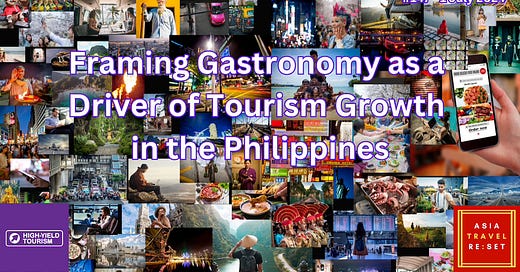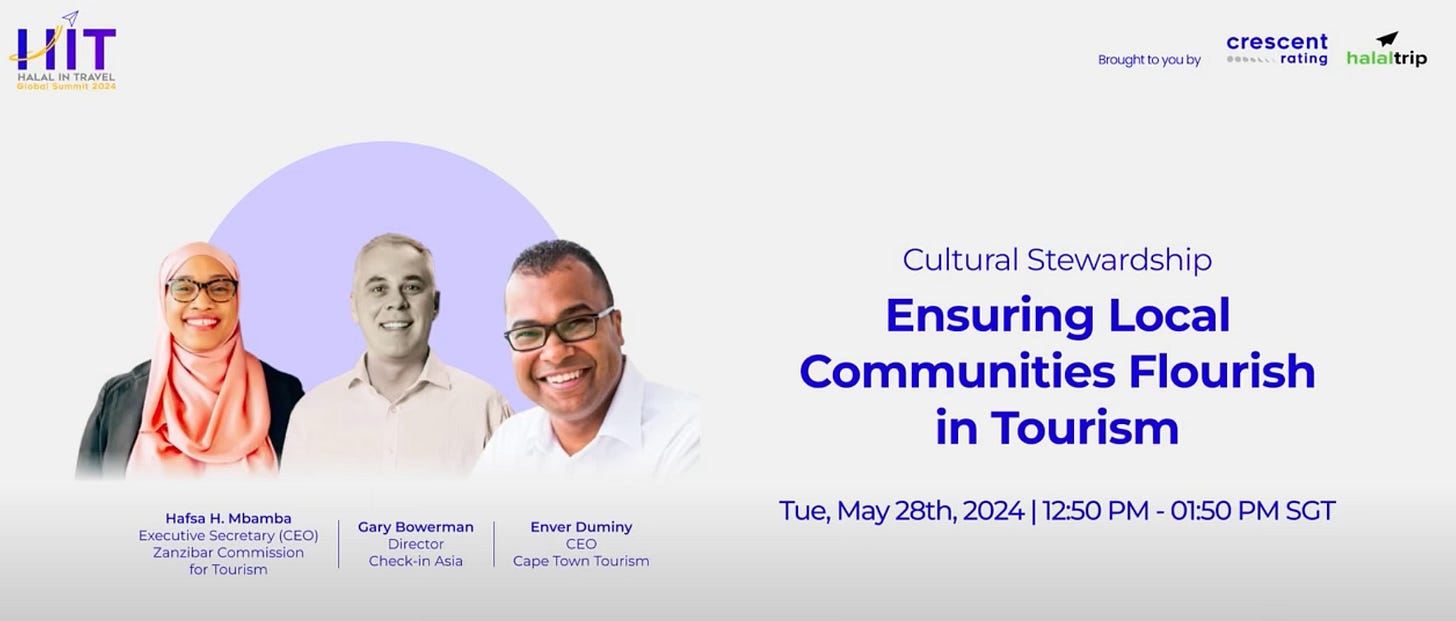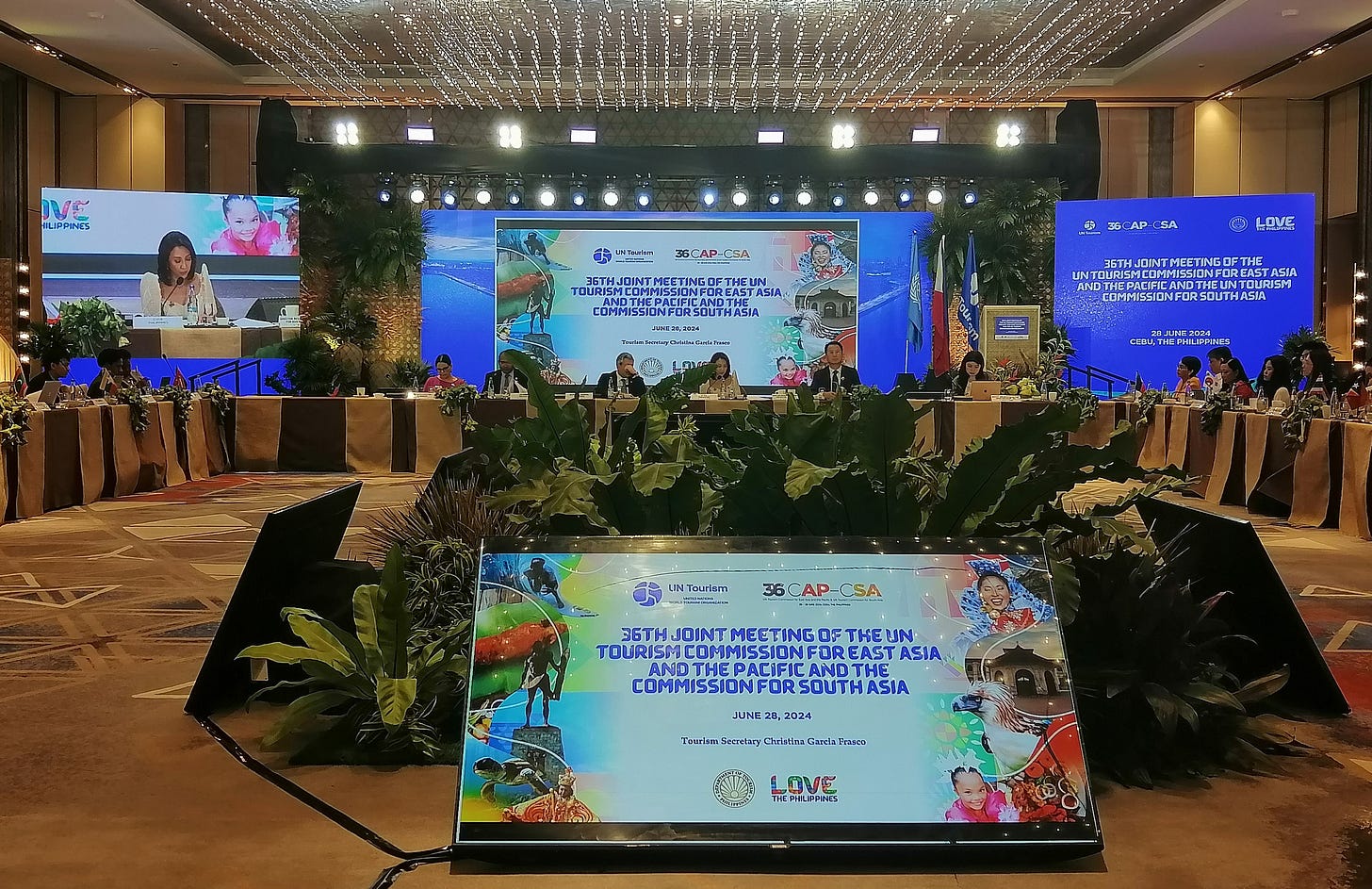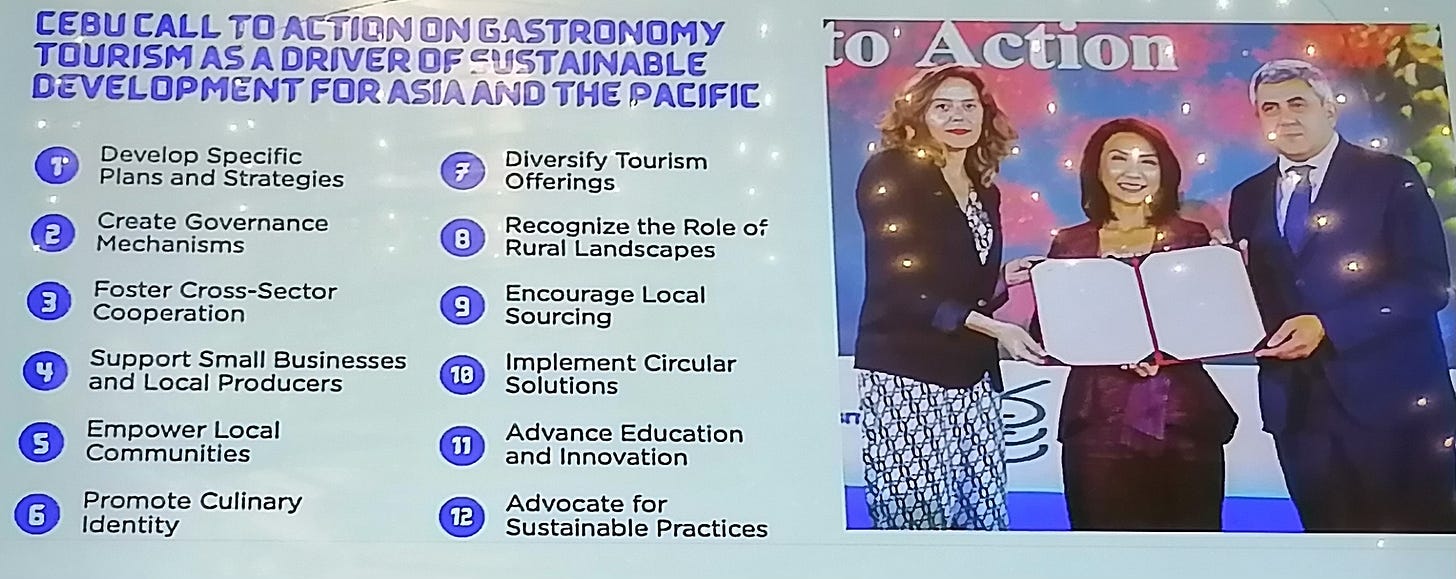Issue #147 - Framing Gastronomy as a Driver of Tourism Growth in the Philippines
Delegates from 43 countries meet in Cebu for UN Tourism’s APAC forum.
Welcome to issue 147 of Asia Travel Re:Set.
Last week, Cebu in the Philippines hosted the 1st UN Tourism Forum on Gastronomy Tourism for Asia Pacific. In July, a first African regional event will also take place.
The symbiosis of cuisines and tourism is not new, but developing culinary tourism is now widely viewed as a powerful competitive advantage.
I joined delegates from 43 countries to learn about the host nation’s blueprint.
So, let’s follow that train of thought…
Thanks for checking in.
- “IN THE NEWS”
- Framing Gastronomy as a Driver of Tourism Growth in the Philippines
Delegates from 43 countries meet in Cebu for UN Tourism’s APAC forum
“IN THE NEWS”
Cultural Stewardship: Ensuring Local Communities Flourish in Tourism. During the Halal in Tourism Global Summit 2024, I joined Hafsa H. Mbamba, CEO of Zanzibar Commission for Tourism, and Enver Duminy, CEO of Cape Town Tourism, for an insightful panel discussion. Learn about strategies for safeguarding local cultures in a changing tourism landscape and responsible practices that align with sustainable development goals and contribute to economic growth. Watch the video HERE.
Framing Gastronomy as a Driver of Tourism Growth in the Philippines
This week, I joined delegates in Cebu from 43 countries to eat, travel and debate the future of culinary tourism. UN Tourism’s first Gastronomy Tourism Forum for Asia Pacific was co-organised by UN Tourism and the Basque Culinary Centre, and hosted by the Department of Tourism of the Philippines.
Dining and street food are integral to tourism marketing across Asia Pacific. Food is one of Thailand’s 11 ‘Soft Powers’ to promote the country. Eating outdoor barbecue catapulted Zibo to become China’s spring 2023 tourism hotspot. The 2024 Asia’s 50 Best Restaurant list was increased from 50 to 100. Japan’s government publishes an annual survey about preferred culinary choices in its cities. Last October, Battambang (Cambodia), Chaozhou (China), Gangneung (South Korea) and Iloilo (Philippines) were added to the UNESCO Creative Cities of Gastronomy list. Last month, the Halal Gastronomy Awards were launched in Singapore.
Promoting food cultures, ingredients, preparations and culinary backstories is gaining heightened importance as regional tourism competition intensifies. UN Tourism data shows that arrivals to Asia Pacific destinations “reached 82% of pre-pandemic levels in the first quarter of 2024” - and food is a key driver of destination choices and a 24/7 viral theme for social media videos and images viewed by travellers around the region.
The purpose of the Cebu forum, said Christina Garcia Frasco, Secretary, Department of Tourism of the Philippines, was to “cultivate a symbiotic relationship between two important economic sectors: tourism and gastronomy.” It forms part of a longer term plan to leverage food tourism “for the growth of various sectors of the economy.”
Tourism & Socio-Economic Development
Like many of its South East Asian neighbours, the Philippines - which is a vast archipelago of 7,641 islands - is placing tourism at the centre of socio-economic development. The vision, Ms Frasco said, is “to attract more tourists, more investments, more visitor receipts and, overall, to stimulate economic growth to provide livelihoods and employment to our fellow Filipinos.”
The Gastronomy Tourism Forum was a highlight of the 36th Joint Meeting of the UN Tourism Commission for East Asia and the Pacific and the Commission for South Asia. Opening the conference, Ferdinand Marcos Jr, President of the Philippines, acknowledged the economic potential of tourism for a developing nation with a population of approx. 120 million. In 2023, tourism directly contributed 8.6% to the nation’s GDP, he said, but. “Going beyond the monetary values and numbers, [a thriving tourism industry] means millions of lives being changed for the better.”
While the Philippines attracted 5.4 million visitors in 2023 - placing it midway down the regional ladder in volume terms - the overall economic value is increasing. The PHP2.09 trillion generated by the sector in 2023 represented 48% growth over (pandemic-hit) 2022, “the highest value-added share of any year since 2000”. The 2024 target is 7.7 million visitors, with a goal of overhauling 2019’s 8.3 million in 2025.
Improving Connectivity
Various challenges for building tourism as a pillar of the national economy include infrastructure. It is important, President Marcos noted, “to ease visa access and to improve our connectivity hubs, like airports.” The much-needed USD3 billion redevelopment of Manila’s Ninoy Aquino International Airport is finally set to go ahead, but more gateway expansions are required to facilitate visitor growth around the archipelago.
Attracting investment is a priority. The Department of Tourism is working with UN Tourism to establish investment guidelines “to help the Philippines further expand its room keys, improve tourism infrastructure and open up other opportunities in the tourism value chain.”
The event closed with the publication of a 12-point Call to Action. This framework is designed to help public and private sector entities in member nations and regions to develop their gastronomy tourism economies.
Many of these developmental issues will be revisited, and new ones added, at the 37th edition of the UN Tourism Forum for the 2 APAC regions in 2025 in …. Bali.
And, that’s a wrap for issue 147.
The Asia Travel Re:Set newsletter will be back next Sunday.
Until then, find me at LinkedIn, The South East Asia Travel Show and High-Yield Tourism.
Happy travels,
Gary










Very interesting. The Philippines are a beautiful destination -But I think there's not enough awareness about its culinary offering, especially if compared to other countries in the region.